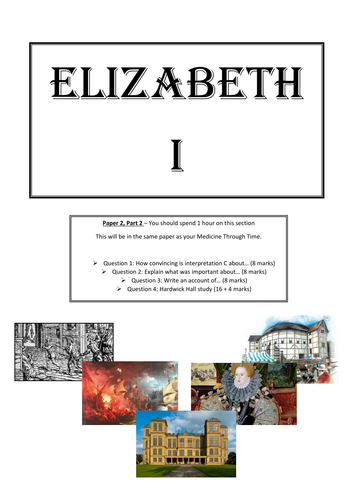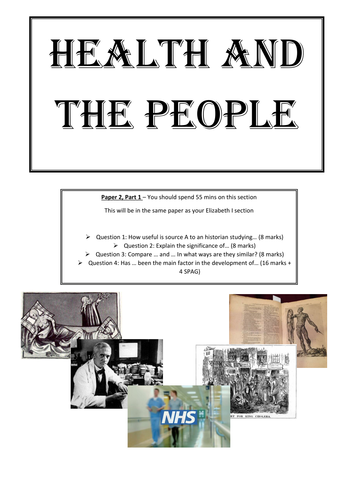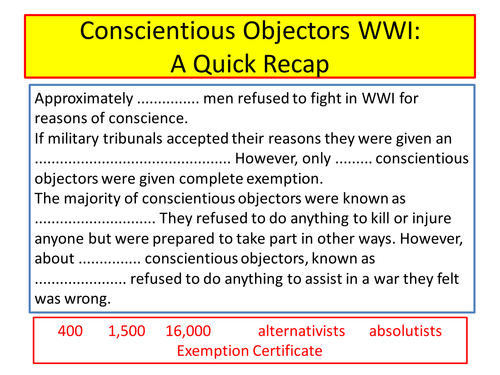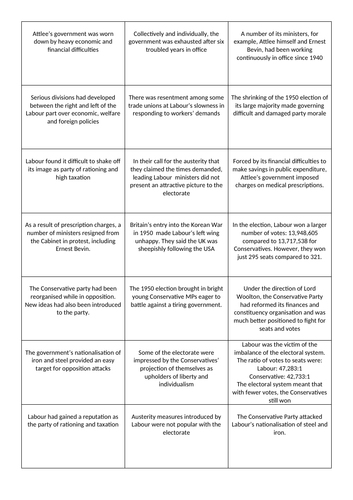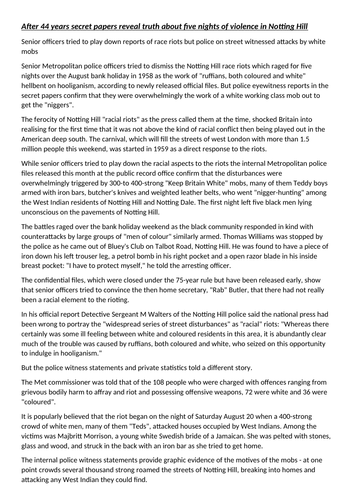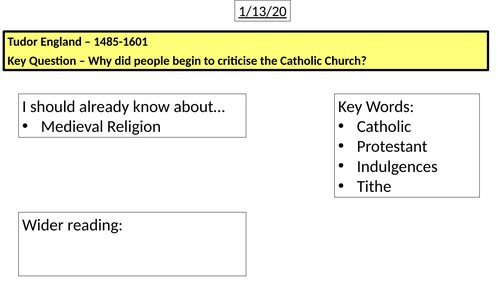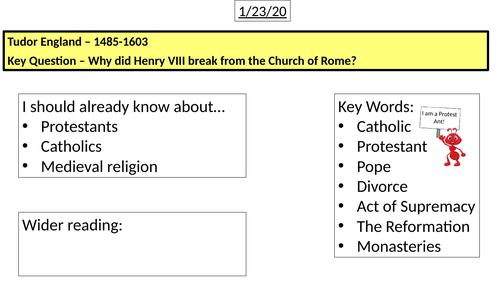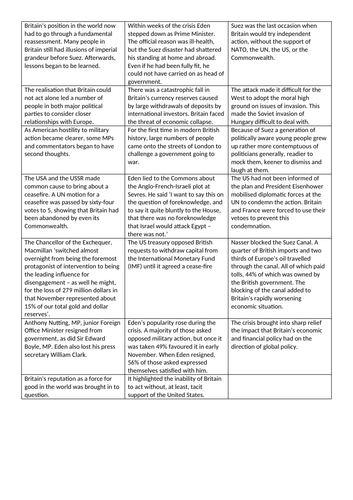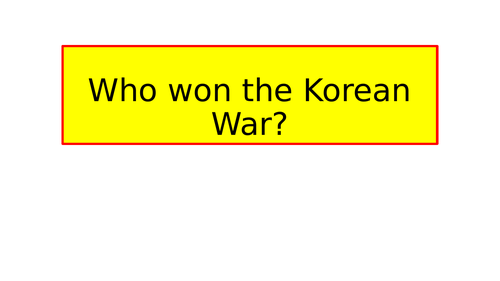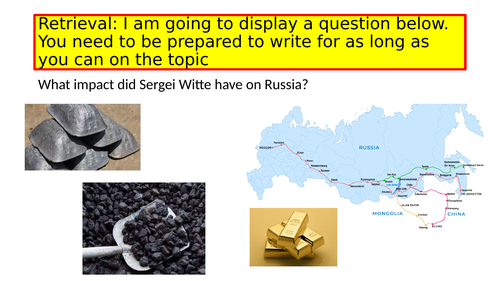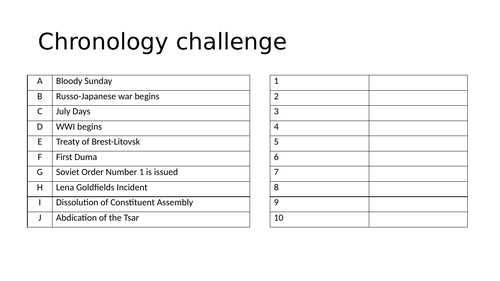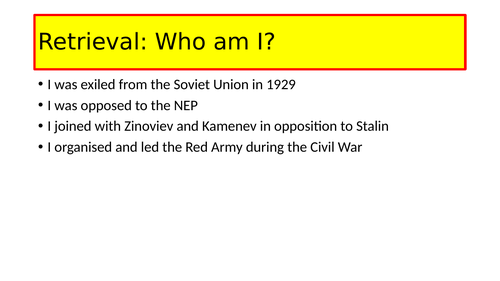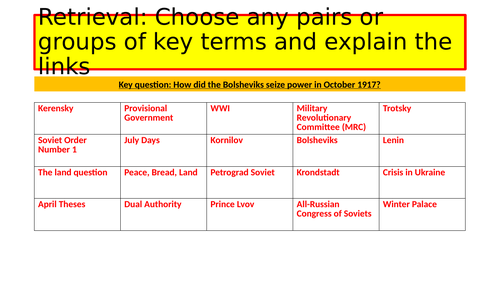
170Uploads
40k+Views
18k+Downloads

Crime and Punishment - Conscientious Objectors WWII
A GCSE lesson on conscientious objection in WWII. Students will compare COs in WWI and WWII. They will evaluate the extent to which the attitudes of the government and the public changed.

Crime and Punishment - Conscientious objectors WWI
A GCSE lesson for the Edexcel course on Crime and Punishment. Students will use a range of characters to understand different attitudes to conscientious objectors and the different reasons for conscientious objection during WWI.

Making of Modern Britain - Conservative fall 1964
An A-level lesson in which students examine the causes of the Conservative fall from power in 1964. Students will work in groups to evaluate the relative significance of a range of factors before reaching their overall judgement.

Making of Modern Britain - 1951 Labour defeat
An A-level lesson in which students understand the reasons for Labour’s defeat in the 1951 election, providing valuable contextual knowledge for the beginning of the course in 1951. Students will be required to categorise their reasons and begin supporting their arguments.

AQA 7042 Making of Modern Britain - Race Riots
An A-level lesson looking at the underlying causes, events and consequences of the Notting Hill Race Riots, in which students carry out an investigation and report back on their findings. Uses a range of sources and historical extracts to support their learning.

Why did people criticise the Catholic Church?
A KS3 lesson which introduces the split between Catholics and Protestants before students study the Reformation in England. Students will consider why people began to criticise the Catholic Church before writing their own version of Luther’s 95 theses to demonstrate their understanding.

Russia: Witte's economic reforms
An A-level lesson in which students prepare a response to the essay question: ‘How far did Witte succeed in his plans to reform Russian industry in the years 1893-1903?’.
Students will use a card sort to organise their paragraphs and to form their argument. Students will use the main activities to put together an essay plan to answer the question. The essay plan provides structured support for students who may need it. They will finish by reaching judgements on essay questions on the same topic with different wording so that students can learn to focus their argument on the question specifically.

AQA 8145 Medicine - Medieval Doctors
A GCSE lesson in which students will compare the effectiveness of different types of doctors who were available during the Medieval period. Students make the comparisons by completing top trumps cards for apothecaries, barber surgeons, physicians and wise women and evaluate their training, available treatments and cost. Students will also match up the Medieval patient with the most appropriate doctor to demonstrate understanding of the different roles that they played.

The Reformation - Why did Henry break from Rome?
A KS3 lesson which includes practice of a GCSE style question. Students will need to have knowledge of the Break from Rome and will build on their knowledge to produce a written answer. Students will produce sequence events to show the connections to be able to explain the Reformation. All resources needed are included in the PowerPoint.

Russia - Stolypin's policies
An A-level lesson in which students will evaluate and analyse the the success of Stolypin’s policies, with a focus on his land reforms. Students will use the aims of Stolypin as a way in which to measure his success. Students will work in groups to assess the level of success in comparison to one key aim, before reporting back to other students. Studnets will finish with a judgement in respones to the essay style question.

Making of modern Britain - Suez Crisis
An A-level lesson in which students examine the significance of the Suez Crisis on Britain. Students will sequence the events leading to the crisis, before analysing the impact of the crisis on Britain, and in particular will gain an understanding of how Britain’s place in the world changed as a result of Suez.

UN involvement in Korean War
A GCSE resource for the conflict and tension in Asia unit. Students will understand the reasons for UN involvement, and analyse the role of the USA in the process. Students will apply their understanding of the causes so far to reach a judgement on the country/organisation most responsible for the outbreak of war.

How did the Korean War end in Stalemate?
A GCSE lesson in which students will understand how the Korean War ended in a stalemate. Students will use a skim read task to understand the events, before applying their understanding to an explanation task in which students must explain how one event caused the next. In doing so, students work towards a ‘write an account’ style question on the events of the Korean War. Students will finish with a judgement about why the Korean War ended in stalemate by deciding on which statement they agree with most. Suited for AQA Conflict and Tension in Asia specification.

Who won the Korean War?
A GCSE lesson in which students analyse and evaluate the impact of the Korean War. Students will compare the gains and losses of the countries and organisations involved in the war. This leads to an exam practice question on the 16 mark essay in which students must decide who won and lost.

Russia - Lenin's legacy
An A-level lesson in which students analyse and evaluate the impact of Stalin on Russia. Students will progress through tasks which enable them to consider successes and failures, before categorising and prioritising their information to form the basis of an essay plan. Students will reach a judgement on an essay question about Lenin’s greatest achievement. Works well to consolidate their understanding on Lenin’s rule as it offers an opportunity to recap many of the key ideas.

Russia - success of War Communism and NEP
A lesson in which students review their learning on War Communism and NEP to consider the more successful policies. Students will analyse success by considering their achievement according to criteria such as unity in the Bolshevik party, and increasing agricultural production. Students are required to reach judgements as to which policy was better according to each before reaching an overall conclusion about which was better for the Bolshevik party. This enables students to consider success from a different perspective beyond economic success.

Russia - Civil War and Bolshevik victory
A lesson in which students analyse the reasons for Bolshevik victory in the Civil War. Students will sort evidence in to two main categories: red strengths and white weaknesses, before categorising further in to factors. Students will use these factors to help them to create links between the factors in a linking lines activity. Students will finish by considering whether they think the outcome of the Civil War was a foregone conclusion.

Russia - Purges
An A-level lesson in which students will explain, evaluate and analyse the effectiveness of Stalin’s purges. Students will consider the post-Kirov purges, purges of party, army and people and will complete a chart in which they use the necessary skills for effective essay writing by adding their analysis and evaluation of each different purge. Students will be able to draw conclusions about the importance and effectiveness of the purges for Stalin’s consolidation of power.

Fan 'n' pick - Lenin's Russia
A set of Fan ‘n’ pick cards which cover the course content for A-level students on the topic of Lenin’s rule. Also included is a data capture sheet for students to pre-assess their level of knowledge on the different topics such as war communism and the NEP. This has worked effectively as a revision tool, or retrieval tasks.

Russia - Second Five Year Plan
An A-level lesson in which students will compare the successes of the First and Second FYPs. The lesson is based on students having already studied the first FYP. Includes paired work in which students construct lists of similarities and differences, and group work in which students interrogate statements about the relative successes of the plans and must reach an informed and substantiated judgement.

